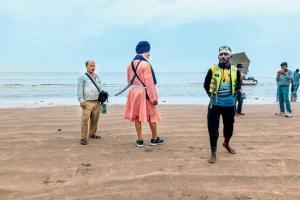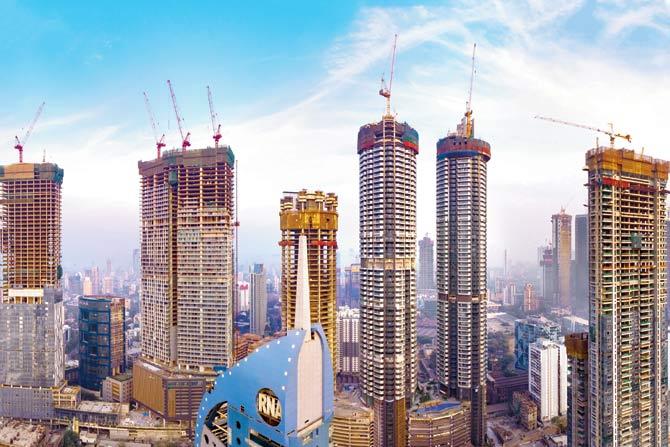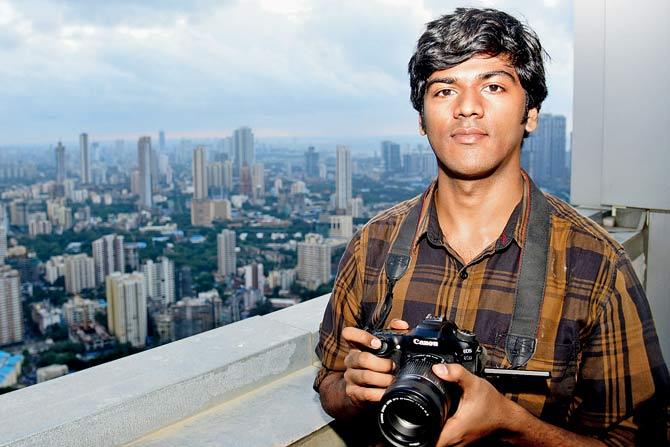In a city that's changing every hour-losing a tree, gaining a bridge, dropping a profession, changing a street name- these Instagrammers are chroniclers that history will have much to thank for

People don't necessarily make it to Gopal MS' @mumbaipaused feed. Every once in a while, as you're scrolling mindlessly, you'll see a striking image that'll make you stop and look
Gopal MS lives in the present. He is excited about the ever-changing nature of Mumbai and makes no conscious attempt to find out about the history of the place he is photographing. "I'm not into nostalgia," he says. His feed reflects that too.
ADVERTISEMENT
For 10 years, the 46-year-old ad executive, has been documenting everyday life in the city as Mumbai Paused. What started as a blog in 2009 has taken a life of its own on Instagram. Every day, religiously, Gopal posts snapshots of what he sees around him. The blog continues to exist but, clearly, the action has shifted to Instagram where the posts go up, fast and furious, often with a caption not exceeding a few words, or, sometimes with just a hashtag. The posts don't look longingly to the city of the past. Neither do they aim to aesthetically please. Each one showcases a slice of life, something extraordinary in its ordinariness. On weekday mornings, Gopal takes an early train from Vashi, where he lives, to Wadala, Sewri or Cotton Green. From there he walks to work in Lower Parel. "I try to take a different route every day," he says. With the dense web of bylanes spread out in these neighbourhoods, he's never out of options. Gopal's lack of interest in history, doesn't mean he isn't aware of the stories behind what he captures.
 Gopal also documents murals like this one, made by unknown artists under the hashtag #AamArtistGallery
Gopal also documents murals like this one, made by unknown artists under the hashtag #AamArtistGallery
As we pass a nondescript cast iron pole, he points out that it's a British Era chimney for the gases to escape the sewage system. Nondescript is where Gopal thrives. It isn't unusual to 'you have an eye for detail' comment under every other post. Another gem he shares is about truck art. "Almost all south Indian truck art is stencil-based. Trucks with north Indian registration plates will have hand-drawn paintings, he observes. Even so, Gopal avoids photographing people "unless they make for a compelling story". For most part, they're part of the scene he captures. "You need to chat with them, take their permission; I'm not aiming to be Humans of New York," he says. But what Mumbai Paused does is give you a sense of an outsider looking in.
 Gopal MS works in an advertising agency; every day he takes different routes to his workplace, photographing scenes he witnesses as he walks along. Pic/ Shadab Khan
Gopal MS works in an advertising agency; every day he takes different routes to his workplace, photographing scenes he witnesses as he walks along. Pic/ Shadab Khan
Before he started documenting Mumbai, Gopal was shooting slice of life pictures in Bengaluru which he posted on his blog This Main That Cross. This was in mid-noughts when he landed his first camera. "I thought I shouldn't leave it lying around, carry it with me to work and try and shoot a photo a day," he recollects. "At the end of the month, I realised I had a lot of pictures and didn't know where to upload them." It's not a conundrum he faces now.
Unlike Gopal, who posts almost obsessively—in the few hours after we met, he had posted almost all the pictures he shot—Aslam Saiyad is a lot less frequent. At best, he posts a few updates every week on @mumbai_river_photo_project. Saiyad, like many Mumbai Instagram chroniclers, has looked up to Gopal and used his work as a point of reference. "Earlier, I used to try and take aesthetic pictures. Now, thanks to Gopal, I focus more on the content than on the look," he says. Saiyad's Instagram handle sums up the nature of his work. Even though he began documenting life along Mumbai's rivers in 2012, he debuted on Instagram late in 2016. "I grew up along the Dahisar River in the 1980s and I remember it being clean. At some point, I started photographing life along it, and other rivers of the city. I got those photos printed on sun boards and showcased them across schools, colleges and along rivers that people thought were nullahs," he says. Since he doesn't post pictures every day, Saiyad's process is relaxed. Almost all the photos these days are shot during the river walks he hosts every other weekend or on days when he saunters into Borivli's Sanjay Gandhi National Park to meet people within the sanctuary. Children cycling along the road to reach school, members of the local tribes—everyone seems to know him. That's because Saiyad's work on Instagram extends offline too. He collaborates with the adivasis, introduces cityfolk to their lives and works towards highlighting the importance of preserving urban rivers. "No one knows how many rivers there are in this city. I can name close to a dozen but there are more. Almost all of them are nullahs now and we are to blame. My attempt is to bring people to the source of some of these rivers so that they can see how beautiful they are and show them what life along them is like," he says. "The local tribes here have amazing stories to share; they truly live with nature. Can you imagine cohabiting with termites? There's a lady here whose house has a termite hill... inside her home! We can learn from them."
 Aslam documents the lives of adivasis who reside inside the Sanjay Gandhi National Park and have relied on the rivers for their livelihood
Aslam documents the lives of adivasis who reside inside the Sanjay Gandhi National Park and have relied on the rivers for their livelihood
We've been walking for close to three hours and Saiyad has taken just a couple of shots—a bonfire here, a duck there—when we turn the corner to come to a clearing. No more than 10 feet away, two large deer leap across; all of us instinctively reach out to our phones but the deer have gone. Saiyad laughs. "It's okay," he says, "you've seen them. That's important. How many of your friends can boast of seeing deer in Mumbai on a weekday morning?" The phone stays inside our bag for the rest of the trip.
While Gopal and Saiyad look at life at street level, Sanjog Mhatre offers a bird's eye view of the city on @towering_goals. His feed is highly curated, stylised, slick and features stunning views from some of Mumbai's tallest buildings. Mhatre is in no hurry to populate his feed with on-the-go visuals and takes his time to post an image, not unlike a celebrity dropping a new look—sometimes, a couple of times a week; at other times, just once in 10 days. Even so, Mhatre's feed, a capitalist's wet dream, is fascinating for the way it shows the views that Mumbai's one percenters enjoy. It is, for the want of a better word, aspirational.
 Aslam Saiyad grew up along the Dahisar river and remembers a time it was clean. To highlight the damage caused, he started photographing life along Mumbai’s rivers. Pic/ Satej Shinde
Aslam Saiyad grew up along the Dahisar river and remembers a time it was clean. To highlight the damage caused, he started photographing life along Mumbai’s rivers. Pic/ Satej Shinde
It's probably what drew Mhatre to it too. He says he cannot explain his fascination for tall buildings except that "I just am." He was still in school when he laid his hands on his father's 2 MP camera phone. It was around 2007 when he was visiting his cousins in a MHADA building in Parel where construction on some of the tallest buildings in the central Mumbai neighbourhood was still underway. "I couldn't take my eyes off them. Instinctively, I started taking pictures from my father's phone," Mhatre, 21, recollects. After he completed school and was gifted a cameraphone, Mhatre went about photographing every tall building he could see.
 @towering_goals showcases slick and stylised views that Mumbai's one percenters enjoy
@towering_goals showcases slick and stylised views that Mumbai's one percenters enjoy
"For two years, I followed the progress of every major skyscraper in the city on a website called skyscrapercity.com; I'd visit them and photograph. At the time, the intent was to just see and collect photos. But it also served as a ground for research that would come handy later," he says. Somewhere along, Mhatre discovered he was actually good at photography. That's when he decided he was done shooting buildings from the ground. "One day [in 2015], I left home to visit buildings in the Dadar, Lower Parel and Mahalaxmi areas, asking security guards if they could let me shoot from the top floors. At about 5.30 that evening, a security supervisor from Ahuja Towers in Dadar let me inside. That was the first time I was at such a height—55th floor!"
 Sanjog Mhatre has been photographing views of and from some of Mumbai’s tallest structures. Pic/ Shadab Khan
Sanjog Mhatre has been photographing views of and from some of Mumbai’s tallest structures. Pic/ Shadab Khan
Mhatre kept chipping away at his feed over the next couple of years but it wouldn't be until 2017 that he began work on it in earnest. "I approached a sales guy at Indiabulls Sky and offered to let him use my pictures for his promotions. He agreed and my work took off," he says. Since then, developers have taken notice of Mhatre and approach him to shoot pictures and videos from their buildings. "Occasionally, I approach them because I need content to keep my Instagram updated." So far, he has been on top of more than 50 buildings and has over 16,000 followers. "I've also gone back to school to complete my graduation in filmmaking. Obviously, this is going to be a lifelong career. It makes sense to get a formal degree."
50
Number of buildings Sanjay Mhatre has accessed to shoot a bird's eye view
Catch up on all the latest Mumbai news, crime news, current affairs, and also a complete guide on Mumbai from food to things to do and events across the city here. Also download the new mid-day Android and iOS apps to get latest updates
 Subscribe today by clicking the link and stay updated with the latest news!" Click here!
Subscribe today by clicking the link and stay updated with the latest news!" Click here!






